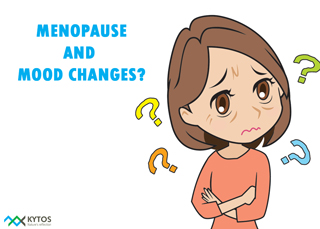
The HORMONAL CHANGES during and after menopause can cause emotions to change quite quickly that is swinging from JOY at a moment to ANGER the next moment.
It is important to pay attention to your emotions and consider how you are really feeling.
During the menopause transition, general symptoms of ANXIETY, DEPRESSION, and MOOD DISTURBANCES are common especially in those with severe vasomotor symptoms, sleep disturbance, and surgical menopause.
- Decreased interest in most activities
- Feeling tired
- Feeling sad and depressed most of the day, nearly every day
- Change in appetite and sleep pattern
- Feelings of worthlessness and inappropriate guilt
- Reduced concentration
- Difficulty in decision-making
- Negative thoughts
Risk Factors for depression
Physical symptoms such as disturbed sleep, hot flushes and emotional reasons such as negative attitude towards menopause.
Night sweats can disturb sleep and leave many women awake at night, feeling exhausted and experiencing difficulty in clear thinking, leaving them more negative because of lack of quality sleep.
Personal factors can contribute to mood disorders during menopause such as family history or previous episode of depression, personal tendency to worry a lot, lack of self-esteem, long-term or serious medical illness, relationship problems, drug and alcohol problems and poor lifestyle.
Research suggests women who have a surgical menopause and/or an early menopause are more likely to experience a clinical depression caused by all of a sudden change in hormones rather than women who have a ‘natural’ menopause.
There are many things you can do to improve your mood and reduce stress:
Check out the symptoms at http://bit.ly/1Qj0i0F and seek help if your symptoms last for more than 2 weeks.
Moderate to severe depression will require antidepressant medication. Severe depression and anxiety can respond to treatment with medication such as antidepressants in combination with counselling therapy from a registered psychologist or psychiatrist. Speak to your doctor to find out the best option for you.
References
-
Burcusa SL, Iacono WG. Risk for recurrence in depression. Clinical psychology review. 2007;27(8):959-85.
-
Hickey M, Bryant C, Judd F. Evaluation and management of depressive and anxiety symptoms in midlife. Climacteric. 2012;15(1):3-9.
-
Gibbs Z, Kulkarni J. Risk Factors for Depression During Perimenopause. Women’s Reproductive Mental Health Across the Lifespan2014.
-
Freeman EW. Associations of depression with the transition to menopause. Menopause (New York, NY). 2010;17(4):823-7.
-
Gibbs Z, Lee S, Kulkarni J. The unique symptom profile of perimenopausal depression. Clinical Psychologist. 2014.
-
Clayton AH, Ninan PT. Depression or menopause? Presentation and management of major depressive disorder in perimenopausal and postmenopausal women. Primary care companion to the Journal of clinical psychiatry. 2010;12(1):PCC.08r00747.
-
Maki PM, Freeman EW, Greendale GA, Henderson VW, Newhouse PA, Schmidt PJ, et al. Summary of the National Institute on Aging-sponsored conference on depressive symptoms and cognitive complaints in the menopausal transition. Menopause. 2010;17(4):815-22.
-
Ryan J, Burger HG, Szoeke C, Lehert P, Ancelin ML, Henderson VW, et al. A prospective study of the association between endogenous hormones and depressive symptoms in postmenopausal women. Menopause (New York, NY). 2009;16(3):509-17.
-
Bromberger JT, Kravitz HM. Mood and menopause: findings from the Study of Women’s Health Across the Nation (SWAN) over 10 years. Obstetrics and gynecology clinics of North America. 2011;38(3):609-25.
-
American Psychiatric Association. DIAGNOSTIC AND STATISTICAL MANUAL OF MENTAL DISORDERS FOURTH EDITION. 2000.
-
Ayers B, Forshaw, M., Hunter, M.S. The impact of attitudes towards the menopause on women’s symptom experience: a systematic review. Maturitas. 2010;65(1):28-36.
-
Will MA, Randolph JF. The influence of reproductive hormones on brain function in the menopausal transition. Minerva ginecologica. 2009;61(6):469-81.
Mood and Menopause















I’ve been in therapy for depression, it’s been years though. And I’ve learned to keep a mood journal of sorts to learn to tell when a down time is coming. And I’ve recently taken up yoga and meditation, and that has really helped. It’s low-cost and something you can do on your own. But of course, I know if it gets too serious, to get some outside help.
Thank you for the sensible critique. Me & my neighbor were just preparing to do some research about this. We got a grab a book from our area library but I think I learned more clear from this post. I’m very glad to see such great info being shared freely out there.
Glad that you like it. Thanks! 🙂